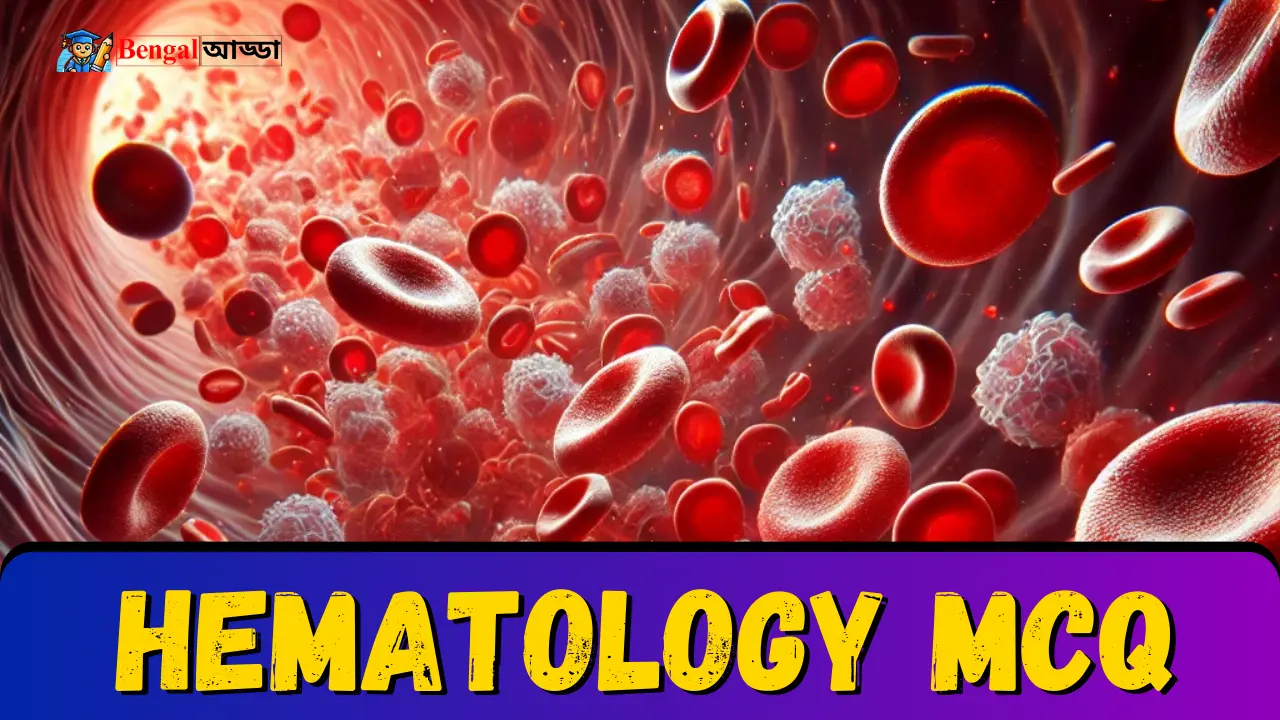Hematology MCQ ও MLT MCQ মেডিকেল শিক্ষার্থী, Lab Technician এবং Healthcare Professional দের জন্য অত্যন্ত গুরুত্বপূর্ণ, যারা Blood সম্পর্কিত Disorder নিয়ে কাজ করেন। এই Multiple Choice Question গুলো Red এবং White Blood Cell এর Physiology, Blood Clotting Mechanism, Blood Disorder এবং Laboratory Diagnostic Technique সম্পর্কে জ্ঞান মূল্যায়ন করতে সহায়তা করে। এই MCQ ( MLT MCQ ) অনুশীলনের মাধ্যমে শিক্ষার্থীরা Hematology সম্পর্কিত বিভিন্ন Concept আরও ভালোভাবে বুঝতে পারেন এবং বিষয়টির সাম্প্রতিক Advancement সম্পর্কে Updated থাকতে পারেন।
একনজরে
এই MCQ বিশেষভাবে উপকারী Medical Student, Diagnostic Lab এর Technologist এবং Hematology সংশ্লিষ্ট Certification অর্জন করতে ইচ্ছুক Professional দের জন্য। এটি গুরুত্বপূর্ণ বিষয়গুলিকে কাঠামোবদ্ধভাবে উপস্থাপন করে, যেমন Anemia, Leukemia, Clotting Disorder এবং Blood Transfusion Science। এছাড়াও, এটি Theoretical Knowledge দৃঢ় করতে এবং Practical Diagnosis ক্ষেত্রে প্রয়োগ করতে সহায়তা করে।
Educator দের জন্য, এই MCQ একটি কার্যকর Teaching Tool হিসেবে কাজ করে, যা শিক্ষার্থীদের Hematology সংক্রান্ত বোঝাপড়া মূল্যায়ন করতে সাহায্য করে। এটি Self-Assessment এর সুযোগ দেয়, যার মাধ্যমে শিক্ষার্থীরা তাদের দুর্বল বিষয়গুলি চিহ্নিত করে আরও ভালোভাবে প্রস্তুতি নিতে পারেন। Exam Preparation এর জন্য, Hematology MCQ Healthcare Professional দের জন্য একটি শক্তিশালী ভিত্তি গড়ে তুলতে গুরুত্বপূর্ণ ভূমিকা রাখে।
Hematology MCQs | MLT MCQ
- Which of the following is the most common type of hemoglobin in adults?
A) HbA
B) HbF
C) HbS
D) HbC - What is the primary function of erythropoietin?
A) Stimulate platelet production
B) Regulate iron absorption
C) Stimulate red blood cell production
D) Enhance clotting factors - Which vitamin is essential for proper blood clotting?
A) Vitamin A
B) Vitamin B12
C) Vitamin K
D) Vitamin D - Which of the following cells is responsible for phagocytosis?
A) Erythrocytes
B) Neutrophils
C) Platelets
D) Basophils - What is the lifespan of a red blood cell in circulation?
A) 10 days
B) 30 days
C) 60 days
D) 120 days - What condition results from a deficiency of vitamin B12?
A) Sickle cell anemia
B) Hemophilia
C) Pernicious anemia
D) Thalassemia - Which of the following is a key feature of sickle cell disease?
A) Excessive bleeding
B) Abnormal hemoglobin structure
C) Low platelet count
D) Increased clotting tendency - What is the primary function of platelets?
A) Oxygen transport
B) Immune defense
C) Blood clotting
D) pH regulation - Which of the following laboratory tests measures the oxygen-carrying capacity of blood?
A) Hematocrit
B) Platelet count
C) Prothrombin time
D) White blood cell count - Which of the following is an anticoagulant?
A) Thrombin
B) Fibrinogen
C) Heparin
D) Calcium - Which of the following is the most common type of hemoglobin in adults?
A) HbA
B) HbF
C) HbS
D) HbC - What is the primary function of erythropoietin?
A) Stimulate platelet production
B) Regulate iron absorption
C) Stimulate red blood cell production
D) Enhance clotting factors - Which vitamin is essential for proper blood clotting?
A) Vitamin A
B) Vitamin B12
C) Vitamin K
D) Vitamin D - Which of the following cells is responsible for phagocytosis?
A) Erythrocytes
B) Neutrophils
C) Platelets
D) Basophils - What is the lifespan of a red blood cell in circulation?
A) 10 days
B) 30 days
C) 60 days
D) 120 days - What condition results from a deficiency of vitamin B12?
A) Sickle cell anemia
B) Hemophilia
C) Pernicious anemia
D) Thalassemia - Which of the following is a key feature of sickle cell disease?
A) Excessive bleeding
B) Abnormal hemoglobin structure
C) Low platelet count
D) Increased clotting tendency - What is the primary function of platelets?
A) Oxygen transport
B) Immune defense
C) Blood clotting
D) pH regulation - Which of the following laboratory tests measures the oxygen-carrying capacity of
blood?
A) Hematocrit
B) Platelet count
C) Prothrombin time
D) White blood cell count - Which of the following is an anticoagulant?
A) Thrombin
B) Fibrinogen
C) Heparin
D) Calcium - Question 21: Which of the following is the most common type of hemoglobin in adults?
A) HbA
B) HbF
C) HbS
D) HbC
Answer: A - Question 22: What is the primary function of erythropoietin?
A) Stimulate platelet production
B) Regulate iron absorption
C) Stimulate red blood cell production
D) Enhance clotting factors
Answer: C - Question 23: Which vitamin is essential for proper blood clotting?
A) Vitamin A
B) Vitamin B12
C) Vitamin K
D) Vitamin D
Answer: C - Question 24: Which of the following cells is responsible for phagocytosis?
A) Erythrocytes
B) Neutrophils
C) Platelets
D) Basophils
Answer: B - Question 25: What is the lifespan of a red blood cell in circulation?
A) 10 days
B) 30 days
C) 60 days
D) 120 days
Answer: D - Question 26: What condition results from a deficiency of vitamin B12?
A) Sickle cell anemia
B) Hemophilia
C) Pernicious anemia
D) Thalassemia
Answer: C - Question 27: Which of the following is a key feature of sickle cell disease?
A) Excessive bleeding
B) Abnormal hemoglobin structure
C) Low platelet count
D) Increased clotting tendency
Answer: B - Question 28: What is the primary function of platelets?
A) Oxygen transport
B) Immune defense
C) Blood clotting
D) pH regulation
Answer: C - Question 29: Which of the following laboratory tests measures the oxygen-carrying capacity of
blood?
A) Hematocrit
B) Platelet count
C) Prothrombin time
D) White blood cell count
Answer: A - Question 30: Which of the following is an anticoagulant?
A) Thrombin
B) Fibrinogen
C) Heparin
D) Calcium
Answer: C - Question 31: Which of the following is the most common type of hemoglobin in adults?
A) HbA
B) HbF
C) HbS
D) HbC
Answer: A - Question 32: What is the primary function of erythropoietin?
A) Stimulate platelet production
B) Regulate iron absorption
C) Stimulate red blood cell production
D) Enhance clotting factors
Answer: C - Question 33: Which vitamin is essential for proper blood clotting?
A) Vitamin A
B) Vitamin B12
C) Vitamin K
D) Vitamin D
Answer: C - Question 34: Which of the following cells is responsible for phagocytosis?
A) Erythrocytes
B) Neutrophils
C) Platelets
D) Basophils
Answer: B - Question 35: What is the lifespan of a red blood cell in circulation?
A) 10 days
B) 30 days
C) 60 days
D) 120 days
Answer: D - Question 36: What condition results from a deficiency of vitamin B12?
A) Sickle cell anemia
B) Hemophilia
C) Pernicious anemia
D) Thalassemia
Answer: C - Question 37: Which of the following is a key feature of sickle cell disease?
A) Excessive bleeding
B) Abnormal hemoglobin structure
C) Low platelet count
D) Increased clotting tendency
Answer: B - Question 38: What is the primary function of platelets?
A) Oxygen transport
B) Immune defense
C) Blood clotting
D) pH regulation
Answer: C - Question 39: Which of the following laboratory tests measures the oxygen-carrying capacity of
blood?
A) Hematocrit
B) Platelet count
C) Prothrombin time
D) White blood cell count
Answer: A - Question 40: Which of the following is an anticoagulant?
A) Thrombin
B) Fibrinogen
C) Heparin
D) Calcium
Answer: C - Question 41: Which of the following is the most common type of hemoglobin in adults?
A) HbA
B) HbF
C) HbS
D) HbC
Answer: A - Question 42: What is the primary function of erythropoietin?
A) Stimulate platelet production
B) Regulate iron absorption
C) Stimulate red blood cell production
D) Enhance clotting factors
Answer: C - Question 43: Which vitamin is essential for proper blood clotting?
A) Vitamin A
B) Vitamin B12
C) Vitamin K
D) Vitamin D
Answer: C - Question 44: Which of the following cells is responsible for phagocytosis?
A) Erythrocytes
B) Neutrophils
C) Platelets
D) Basophils
Answer: B - Question 45: What is the lifespan of a red blood cell in circulation?
A) 10 days
B) 30 days
C) 60 days
D) 120 days
Answer: D - Question 46: What condition results from a deficiency of vitamin B12?
A) Sickle cell anemia
B) Hemophilia
C) Pernicious anemia
D) Thalassemia
Answer: C - Question 47: Which of the following is a key feature of sickle cell disease?
A) Excessive bleeding
B) Abnormal hemoglobin structure
C) Low platelet count
D) Increased clotting tendency
Answer: B - Question 48: What is the primary function of platelets?
A) Oxygen transport
B) Immune defense
C) Blood clotting
D) pH regulation
Answer: C - Question 49: Which of the following laboratory tests measures the oxygen-carrying capacity of
blood?
A) Hematocrit
B) Platelet count
C) Prothrombin time
D) White blood cell count
Answer: A - Question 50: Which of the following is an anticoagulant?
A) Thrombin
B) Fibrinogen
C) Heparin
D) Calcium
Answer: C - Question 51: Which of the following is the most common type of hemoglobin in adults?
A) HbA
B) HbF
C) HbS
D) HbC
Answer: A - Question 52: What is the primary function of erythropoietin?
A) Stimulate platelet production
B) Regulate iron absorption
C) Stimulate red blood cell production
D) Enhance clotting factors
Answer: C - Question 53: Which vitamin is essential for proper blood clotting?
A) Vitamin A
B) Vitamin B12
C) Vitamin K
D) Vitamin D
Answer: C - Question 54: Which of the following cells is responsible for phagocytosis?
A) Erythrocytes
B) Neutrophils
C) Platelets
D) Basophils
Answer: B - Question 55: What is the lifespan of a red blood cell in circulation?
A) 10 days
B) 30 days
C) 60 days
D) 120 days
Answer: D - Question 56: What condition results from a deficiency of vitamin B12?
A) Sickle cell anemia
B) Hemophilia
C) Pernicious anemia
D) Thalassemia
Answer: C - Question 57: Which of the following is a key feature of sickle cell disease?
A) Excessive bleeding
B) Abnormal hemoglobin structure
C) Low platelet count
D) Increased clotting tendency
Answer: B - Question 58: What is the primary function of platelets?
A) Oxygen transport
B) Immune defense
C) Blood clotting
D) pH regulation
Answer: C - Question 59: Which of the following laboratory tests measures the oxygen-carrying capacity of
blood?
A) Hematocrit
B) Platelet count
C) Prothrombin time
D) White blood cell count
Answer: A - Question 60: Which of the following is an anticoagulant?
A) Thrombin
B) Fibrinogen
C) Heparin
D) Calcium
Answer: C - Question 61: Which of the following is the most common type of hemoglobin in adults?
A) HbA
B) HbF
C) HbS
D) HbC
Answer: A - Question 62: What is the primary function of erythropoietin?
A) Stimulate platelet production
B) Regulate iron absorption
C) Stimulate red blood cell production
D) Enhance clotting factors
Answer: C - Question 63: Which vitamin is essential for proper blood clotting?
A) Vitamin A
B) Vitamin B12
C) Vitamin K
D) Vitamin D
Answer: C - Question 64: Which of the following cells is responsible for phagocytosis?
A) Erythrocytes
B) Neutrophils
C) Platelets
D) Basophils
Answer: B - Question 65: What is the lifespan of a red blood cell in circulation?
A) 10 days
B) 30 days
C) 60 days
D) 120 days
Answer: D - Question 66: What condition results from a deficiency of vitamin B12?
A) Sickle cell anemia
B) Hemophilia
C) Pernicious anemia
D) Thalassemia
Answer: C - Question 67: Which of the following is a key feature of sickle cell disease?
A) Excessive bleeding
B) Abnormal hemoglobin structure
C) Low platelet count
D) Increased clotting tendency
Answer: B - Question 68: What is the primary function of platelets?
A) Oxygen transport
B) Immune defense
C) Blood clotting
D) pH regulation
Answer: C - Question 69: Which of the following laboratory tests measures the oxygen-carrying capacity of
blood?
A) Hematocrit
B) Platelet count
C) Prothrombin time
D) White blood cell count
Answer: A - Question 70: Which of the following is an anticoagulant?
A) Thrombin
B) Fibrinogen
C) Heparin
D) Calcium
Answer: C - Question 71: Which of the following is the most common type of hemoglobin in adults?
A) HbA
B) HbF
C) HbS
D) HbC
Answer: A - Question 72: What is the primary function of erythropoietin?
A) Stimulate platelet production
B) Regulate iron absorption
C) Stimulate red blood cell production
D) Enhance clotting factors
Answer: C - Question 73: Which vitamin is essential for proper blood clotting?
A) Vitamin A
B) Vitamin B12
C) Vitamin K
D) Vitamin D
Answer: C - Question 74: Which of the following cells is responsible for phagocytosis?
A) Erythrocytes
B) Neutrophils
C) Platelets
D) Basophils
Answer: B - Question 75: What is the lifespan of a red blood cell in circulation?
A) 10 days
B) 30 days
C) 60 days
D) 120 days
Answer: D - Question 76: What condition results from a deficiency of vitamin B12?
A) Sickle cell anemia
B) Hemophilia
C) Pernicious anemia
D) Thalassemia
Answer: C - Question 77: Which of the following is a key feature of sickle cell disease?
A) Excessive bleeding
B) Abnormal hemoglobin structure
C) Low platelet count
D) Increased clotting tendency
Answer: B - Question 78: What is the primary function of platelets?
A) Oxygen transport
B) Immune defense
C) Blood clotting
D) pH regulation
Answer: C - Question 79: Which of the following laboratory tests measures the oxygen-carrying capacity of
blood?
A) Hematocrit
B) Platelet count
C) Prothrombin time
D) White blood cell count
Answer: A - Question 80: Which of the following is an anticoagulant?
A) Thrombin
B) Fibrinogen
C) Heparin
D) Calcium
Answer: C - Question 81: Which of the following is the most common type of hemoglobin in adults?
A) HbA
B) HbF
C) HbS
D) HbC
Answer: A - Question 82: What is the primary function of erythropoietin?
A) Stimulate platelet production
B) Regulate iron absorption
C) Stimulate red blood cell production
D) Enhance clotting factors
Answer: C - Question 83: Which vitamin is essential for proper blood clotting?
A) Vitamin A
B) Vitamin B12
C) Vitamin K
D) Vitamin D
Answer: C - Question 84: Which of the following cells is responsible for phagocytosis?
A) Erythrocytes
B) Neutrophils
C) Platelets
D) Basophils
Answer: B - Question 85: What is the lifespan of a red blood cell in circulation?
A) 10 days
B) 30 days
C) 60 days
D) 120 days
Answer: D - Question 86: What condition results from a deficiency of vitamin B12?
A) Sickle cell anemia
B) Hemophilia
C) Pernicious anemia
D) Thalassemia
Answer: C - Question 87: Which of the following is a key feature of sickle cell disease?
A) Excessive bleeding
B) Abnormal hemoglobin structure
C) Low platelet count
D) Increased clotting tendency
Answer: B - Question 88: What is the primary function of platelets?
A) Oxygen transport
B) Immune defense
C) Blood clotting
D) pH regulation
Answer: C - Question 89: Which of the following laboratory tests measures the oxygen-carrying capacity of
blood?
A) Hematocrit
B) Platelet count
C) Prothrombin time
D) White blood cell count
Answer: A - Question 90: Which of the following is an anticoagulant?
A) Thrombin
B) Fibrinogen
C) Heparin
D) Calcium
Answer: C - Question 91: Which of the following is the most common type of hemoglobin in adults?
A) HbA
B) HbF
C) HbS
D) HbC
Answer: A - Question 92: What is the primary function of erythropoietin?
A) Stimulate platelet production
B) Regulate iron absorption
C) Stimulate red blood cell production
D) Enhance clotting factors
Answer: C - Question 93: Which vitamin is essential for proper blood clotting?
A) Vitamin A
B) Vitamin B12
C) Vitamin K
D) Vitamin D
Answer: C - Question 94: Which of the following cells is responsible for phagocytosis?
A) Erythrocytes
B) Neutrophils
C) Platelets
D) Basophils
Answer: B - Question 95: What is the lifespan of a red blood cell in circulation?
A) 10 days
B) 30 days
C) 60 days
D) 120 days
Answer: D - Question 96: What condition results from a deficiency of vitamin B12?
A) Sickle cell anemia
B) Hemophilia
C) Pernicious anemia
D) Thalassemia
Answer: C - Question 97: Which of the following is a key feature of sickle cell disease?
A) Excessive bleeding
B) Abnormal hemoglobin structure
C) Low platelet count
D) Increased clotting tendency
Answer: B - Question 98: What is the primary function of platelets?
A) Oxygen transport
B) Immune defense
C) Blood clotting
D) pH regulation
Answer: C - Question 99: Which of the following laboratory tests measures the oxygen-carrying capacity of
blood?
A) Hematocrit
B) Platelet count
C) Prothrombin time
D) White blood cell count
Answer: A - Question 100: Which of the following is an anticoagulant?
A) Thrombin
B) Fibrinogen
C) Heparin
D) Calcium
Answer: C

তন্ময় ব্যানার্জী
আমি তন্ময় ব্যানার্জী , একজন BMLT গ্র্যাজুয়েট এবং BengalAddaa.com এর প্রতিষ্ঠাতা। আমি বাংলা ভাষায় চাকরির খবর এবং শিক্ষামূলক কনটেন্ট তৈরি করি। স্বাস্থ্যের বিষয়ে সঠিক তথ্য ও গাইডলাইন মানুষের কাছে পৌঁছে দেওয়া আমার লক্ষ্য।




